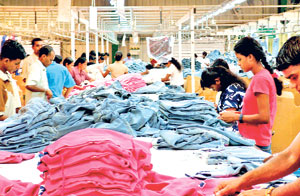| On Friday, thousands of free trade zone garment factory employees turned up to work dressed in white in a show of protest. In their dress, the workers were saying they were in “mourning” over their plight as underpaid, unfairly treated factory staff.
Meanwhile, it is understood that a delegation of garment factory trade unionists will be meeting Opposition common candidate, General (Retd.) Sarath Fonseka, to discuss the situation of the country’s apparel industry workers.
 |
| More than 75 garment factories have closed down in the past few months. |
Industry-linked trade unions say some 8,000 factory vacancies have been created over the past several months as garment factories continue to shut down and factory workers leave the apparel industry in increasing numbers, largely because of poor pay,
According to Palitha Athukorala, president of the Progress Union of Sri Lankan Apparel Workers, the monthly salary of a factory hand is between Rs. 6,500 and Rs. 7,000. This includes overtime pay, working under high-pressure conditions, and little or no other benefits, he adds.
Some 75 factories have closed down in recent months, while those in operation are having a hard time attracting employees to fill the vacancies.
“You see factory representatives daily scouting the surrounding areas of the free trade zone in a desperate search for staff,” Mr. Athukorala said. “They are also scouting in other parts of the country. Job brokers get a commission for each recruit they bring in. This is the reality in the garment business.”
Mr. Athukorala said the Board of Investment (BoI) has not helped the situation either, with its wage increase of a paltry Rs. 500 for this year. “Even the plantation workers get more,” he said.
Free Trade Zone Apparel Union president Anton Marcus says the government, and to a lesser extent the opposition, are both responsible for the current plight of the garment worker. “The two main candidates in the Presidential elections are talking about wars fought and wars won instead of focusing on the real issues the people are facing,” he said.
Mr. Marcus said factory owners were using the global economic crisis as an excuse to cut employee benefits. “It’s happening everywhere,” he said.
Joint Apparel Association Federation chairman S. Sukumaran played down claims by those who tried to explain the factory manpower shortage to staff leaving for personal or family reasons. “Many female workers do leave to go back to their villages for personal reasons, such as to get married, and they don’t return, while others are finding alternative employment in other sectors in the city and the big towns,” he said. |


